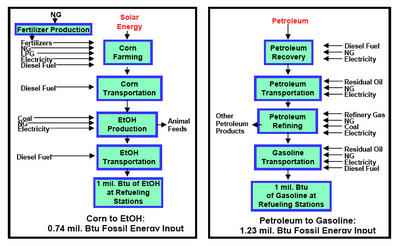ISAF 2005: Greenhouse Gas Emission Results of Fuel Ethanol
NOTE: The International Symposium on Alcohol Fuels held its 15th annual meeting Sept. 26-28, 2005 in San Diego, CA. There were many important and timely papers and presentations delivered at the event for which I will provide abstracts.
Michael Wang of the Center for Transportation Research of the University of Chicago provided a paper and presentation on work sponsored by the U.S. Department of Energy. The title of the paper is "Updated Energy and Greenhouse Gas Emission Results of Fuel Ethanol." He stated that their research revealed that corn-based ethanol achieves energy and GHG emission reduction benefits relative to gasoline primarily because of:
1 - Improved productivity of U.S. corn farming in the past 30 years. Ethanol yield has been increased from less than 2.5 gallons per bushel of corn in the 1980s to 2.7 gallons in 2005.
2 - Reduced energy use in ethanol plants over the past 20 years. During that time, per-gallon energy use has been reduced by more than 30% in wet milling plants and by more than 40% in dry milling plants.
3 - appropriate treatment of ethanol's co-products. Another key finding was that cellulosic ethanol, which can be produced from feedstocks such as woody or herbaceous biomass, offers much larger energy and GHG emission reduction benefits than corn-based ethanol.
The figure below was used to illustrate the energy inputs used to produce and deliver a million British Thermal Units (Btu) of ethanol (EtOH) and petroleum gasoline to a refueling station.
As you can see, the fossil energy input per unit of ethanol is lower—0.74 million Btu fossil energy consumed for each 1 million Btu of ethanol delivered, compared to 1.23 million Btu of fossil energy consumed for each million Btu of gasoline delivered.
Another key finding he presented was that ethanol has a positive benefit in greenhouse gas (GHG) emissions reduction. On a per gallon basis, corn ethanol reduces GHG emissions by 18% to 29%, while cellulosic ethanol has an even greater benefit with an 85% reduction in GHG emissions.
Guide to abbreviations used:
BTU = British Thermal Units
Cell. = Cellulosic
DM = Dry Mill Process Ethanol
E10 = 10% Ethanol blend
E85 = 85% Ethanol Blend
EtOH = Ethanol
FFV = Flexible or Flex Fuel Vehicle
LPG = Liquified Petroleum Gas
NG = Natural Gas
RFG = Reformulated Gasoline
WM = Wet Mill Process Ethanol


No comments:
Post a Comment